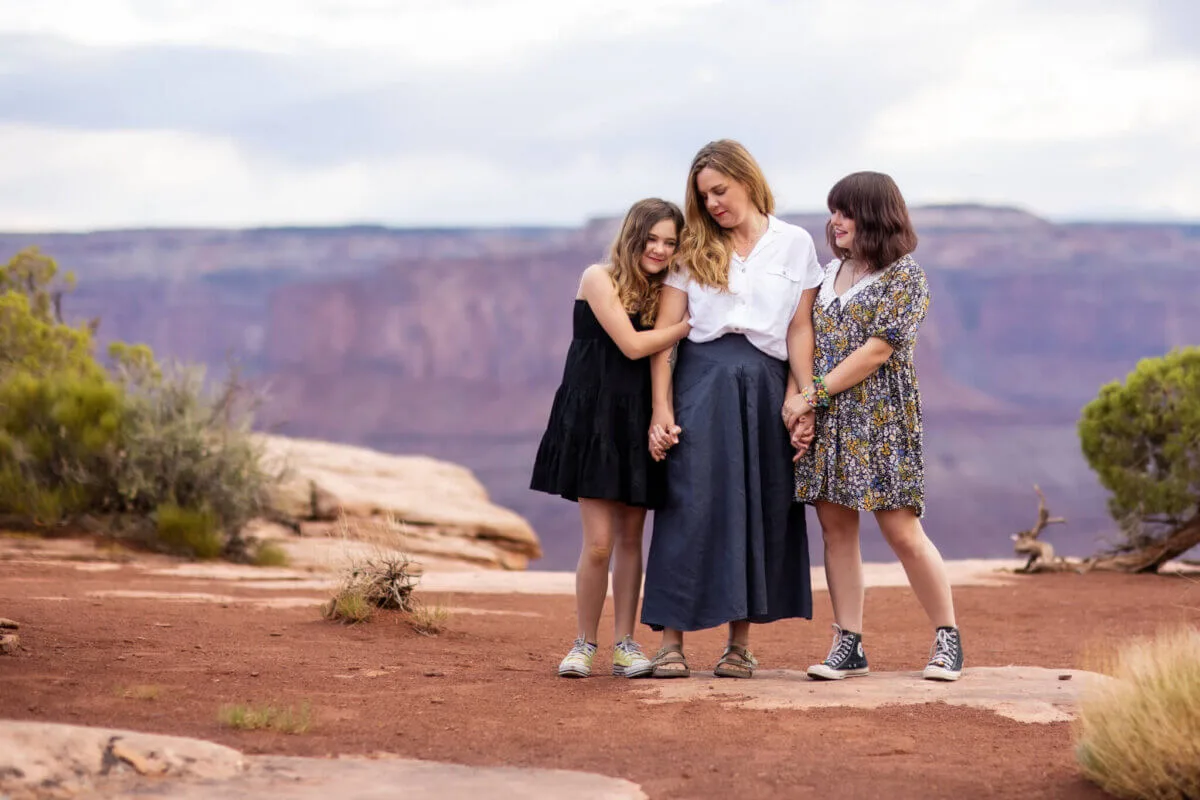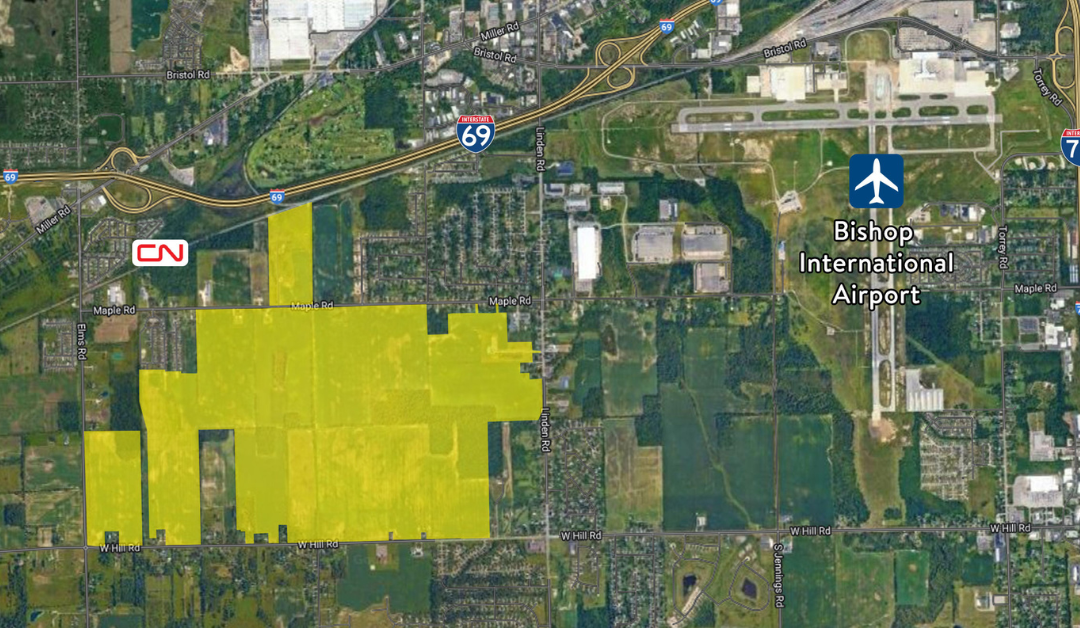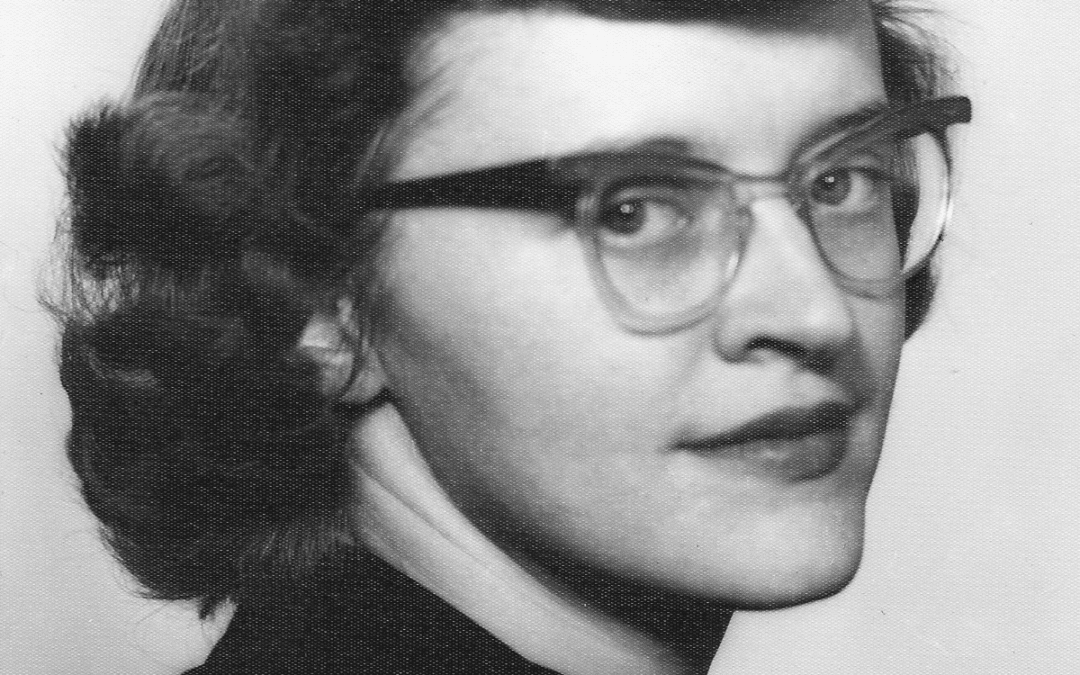
Photograph of Karin Killian and her daughters; image courtesy of Karin Killian
A Traverse City mom shares her abortion story and why she supports abortion rights. She’s one of the 60% of Michigan voters who oppose re-criminalizing abortion, and among the 58% think that abortion should be legal under most circumstances.
Karin Killian has a good life. The kind of life many people aspire to have.
The Traverse City resident has been married for 23 years. She has two daughters that she loves. She’s a writer who has spent 15 years balancing part-time work with full-time mothering. Before she had kids, she put herself through college and served in the Peace Corps.
This life—the kind you might see advertised in a Pure Michigan commercial—is only possible because Killian had an abortion when she was a 20 year old undergraduate living in Chicago.
“I got pregnant. I could barely support myself. I was waiting tables, biking back and forth to work every day because I couldn’t afford to take the train and my parents had divorced the year before and were both struggling to rebuild their lives,” Killian said. “My dad had just experienced a mental health breakdown that I had to help him through. I did not have anybody in my life to support me.”
The man who impregnated her was not someone she could turn to.
“I had nobody else,” she said. “I was not in a place to have a baby. There was no way around it.”
Killian, who was raised in a deeply Catholic household and spent “almost as many hours in church” as she did in school, knows all the arguments people would have given her to try to stop her from having an abortion, had they known.
“I have an adopted sibling. I know that adoption contains grief for everybody. I have people in my life who were forced to give up babies in the 60s and I’ve seen the grief in their eyes,” she said. “I knew exactly what I needed to do, and I did it.”
In a time of her life when so few things were under her control, Killian knew this was a call she could make.
“I never would have finished college, I never would have met the man I married,” she said. “There was no other option for me.”
Looking back after raising her daughters, Killian is even more certain that it was the right choice. “It’s a hell of a lot of work—even just to carry a baby in your body, and I just knew I couldn’t do it.”
If reading Killian’s story leaves you feeling cold or dismissive, consider that nearly one in four women in the United States has had an abortion by age 45, and 60% of women that seek abortion care are already parents. That means that someone you love has probably needed an abortion, and has had a safe way to get it.
Killian was able to receive abortion care because she came of age after the US Supreme Court recognized the constitutional right to abortion in its 1973 Roe v. Wade decision, and because she lived somewhere where it was accessible.
“Women my age were born into this right because of the hard work that was done before we were born,” she said.
Last Friday, tens of millions of American women lost that right when the US Supreme Court, for the first time ever, took away a fundamental right it had previously guaranteed. In a 6-3 decision, the conservative majority Court overturned Roe in its Dobbs v. Jackson ruling. The ruling unleashed fury from the two-thirds of Americans and Michiganders who felt the Roe decision should be preserved.
“What they’re saying is, ‘We want to hold you down,’” Killian said.
At the same time, Killian noted, conservative politicians consistently oppose measures such as paid family leave that would make raising children in America accessible to more people–particularly single parents.
“This is not a pro-life nation,” Killian said.
She also called out the Court’s hypocrisy, noting that just one day before its Dobbs ruling, the same six right-wing judges struck down a 108-year-old New York state law that placed restrictions on carrying concealed guns in public.
“Why is it that states can’t decide the gun rights of individuals but they can decide what women’s bodies can do?” Killian asked. “The system’s broken.”
Jamie Brown, a registered nurse and president of the Michigan Nurses Association, also criticized the Court’s decision, saying it would put people’s lives in jeopardy.
“Health decisions should be made by patients in conjunction with their healthcare provider, not restricted by the government,” Brown said in a statement.
Criticism of the decision wasn’t limited to typically pro-choice circles. Local faith leaders also expressed outrage over the ruling.
“My heart breaks, my anger rises, and my hope feels dimmed by [the] official announcement that reproductive justice, freedom, and rights are no longer promised or protected in our nation,” said Rev. Christopher Roe, acting senior minister at Fountain Street Church in Grand Rapids.
In an interview last month, Rev. Roe described the impending demise of the constitutional right to abortion as a “nuclear bomb in our societal wellness.” Rev. Roe and his colleagues at Fountain Street Church held a vigil on the Saturday after the Court’s decision.
Michigan Overwhelmingly Supports Abortion Rights
The Court’s decision means that all 50 states will now have a patchwork of bans, restrictions, and access. In some states, abortion is already illegal following the Court’s ruling. In Michigan, abortion remains legal—at least for now.
That could change quickly, as a 1931 state law banning abortion could soon go back into effect. The 91-year-old law—which is the subject of two lawsuits and has been temporarily blocked by an injunction in the Michigan Court of Claims—would make it a felony for healthcare professionals to provide abortion services unless it’s to save the life of the mother. The statute does not include exceptions for victims of rape or incest, and it also criminalizes selling or advertising medications that could induce an abortion.
Despite a vocal minority calling for its return, the law is largely unpopular with Michigan voters.
A new Courier Newsroom/Data for Progress poll of nearly 3,000 likely voters in Michigan found that 60% of Michiganders oppose re-criminalizing abortion, while only 34% support it. Note that the poll was conducted in the week preceding the Court’s decision in Dobbs.
Republicans in the state legislature are defending the ban and asking the Court of Claims to reinstitute the 1931 law. Political hopefuls–like all of the state’s Republican candidates for governor–have also explicitly expressed support for the 1931 law or other abortion bans.
If any of the GOP candidates defeat Democratic Gov. Gretchen Whitmer in November, they could join an extreme-right legislature eager to crack down on abortion even more.
A group of Republicans in the state House recently proposed legislation that would require a 10-year prison sentence for abortion providers and a 20-year sentence for anyone who manufactures, sells, or distributes medications intended to induce abortions.
Such proposals are also unpopular with Michigan voters. The Courier Newsroom/Data for Progress poll found that 58% of Michiganders believe abortion should be legal in most circumstances, while only 37% believe it should be illegal in most situations. Again, note that the poll was conducted in the days prior to the Dobbs decision.
A majority (56%) of voters surveyed also support Gov. Whitmer’s lawsuit to strike down the 1931 law and enshrine abortion rights in the state’s constitution. Forty percent oppose the lawsuit.
Reproductive rights supporters are also fighting to codify abortion access in Michigan, gathering signatures for a ballot initiative that would amend the state Constitution to recognize the right to have safe care during childbirth, the right to use birth control, and the right to abortion.
Sixty-two percent of voters said they support the ballot initiative, while only 33% oppose it.
The Reproductive Freedom for All campaign has picked up steam since the Court’s decision, gaining new volunteers and thousands of new donors. A leader of the effort confirmed this week that the petition has more than the required 425,059 signatures needed to place the issue on the ballot, though they’re still accepting signatures from people who want to sign. The deadline to submit petitions to the state is July 11.
As abortion historians have documented, women have sought abortions for hundreds (if not thousands) of years. The only difference is whether they’re legal, safe, and accessible, or illegal, difficult-to-access, and dangerous.
What’s more, the Court’s ruling in Dobbs isn’t only going to impact abortion access; it’s likely to have enormous consequences for women’s healthcare at large. Doctors and women’s healthcare providers are already expressing concerns that abortion bans will make it more difficult for them to treat women experiencing miscarriages and ectopic pregnancies—a life-threatening development that occurs in more than 50,000 pregnancies in the US each year –and women who need intensive medical treatment for cancer and other diseases while pregnant.
For Killian, this fight is something of an existential one.
“I believe that unless we have abortion and contraception rights preserved in the state of Michigan, our state is declaring women to be second-class citizens,” she said. “We won’t stand for it.”
Politics

Michigan lawmakers look to break (another) state funding record for public schools
Democratic lawmakers are hashing out plans to bring state funding for Michigan’s public schools to another new, all-time high—and ensure teachers...

Mundy Twp. project gets state funding in effort to boost local manufacturing
More than $9 million awarded to a planned development project in Genesee County could provide a big boost to the local economy and help create...

It’s official: Your boss has to give you time off to recover from childbirth or get an abortion
Originally published by The 19th In what could be a groundbreaking shift in American workplaces, most employees across the country will now have...
Local News

That one time in Michigan: When we became the Wolverine State
How did Michigan become tied to an animal that's practically nonexistent there? Among the many nicknames that the state of Michigan has, arguably...

Readers’ Choice: Top 5 Bowling Spots in Michigan
From retro lanes — including one of the oldest running bowling alleys in the country — to modern entertainment centers, there's something for...





